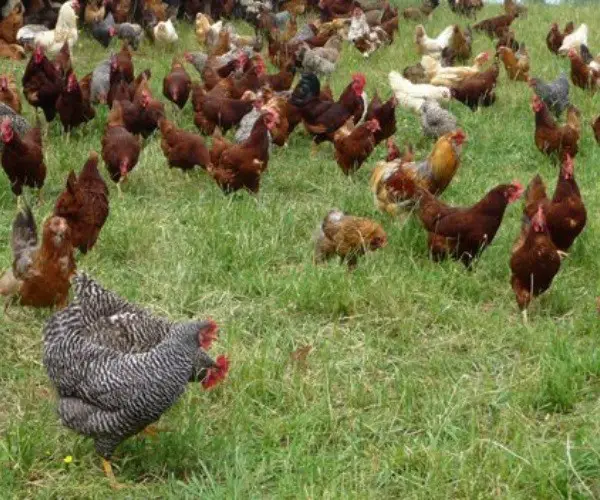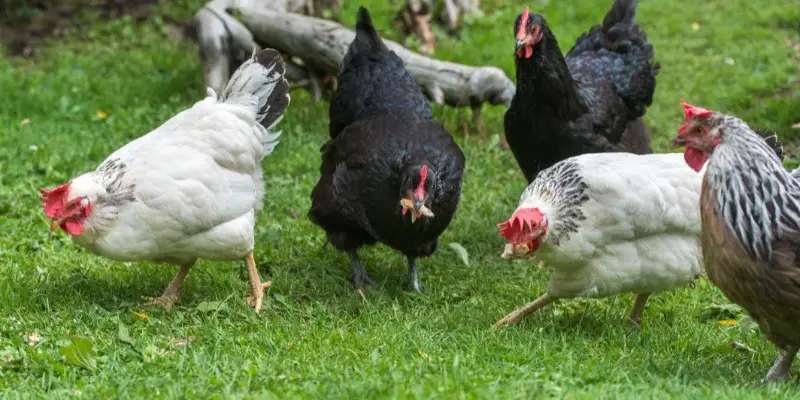Last Updated on January 14, 2025 by Pauline G. Carter
What distinguishes free-range chickens? For starters, they are not confined to small spaces and are able to roam around and stretch their legs. They also typically have access to the outdoors, where they can forage for food and get fresh air and sunlight.
As a result, free-range chickens tend to be healthier and have a more natural diet than chickens that are confined to coops or battery cages.
What qualifies a chicken as free-range?
When it comes to chickens, the term “free-range” is used to describe birds that are raised in an environment where they are able to roam freely and are not confined to a small space. In order to be considered free-range, chickens must have access to the outdoors and be able to move around freely.
There is no legal definition of the term free-range in the United States, but the United States Department of Agriculture (USDA) does have a voluntary certification program for free-range chicken.
In order to be certified, producers must meet certain requirements, including providing chickens with access to the outdoors and ensuring that the outdoor area is spacious enough for the chickens to move around freely.
The USDA free-range certification is not mandatory, but it does provide consumers with a way to identify chicken that has been raised in a free-range environment.
What is the difference between free range chicken and organic chicken?
When it comes to chicken, there are two main types of labels that you might see at the grocery store: free-range and organic. But what exactly do these labels mean? And is there a difference between the two?
Here’s a breakdown of free-range and organic chicken: Free-range chicken is chicken that is raised in a cage-free environment. This means that the chickens have access to the outdoors and are able to roam freely.
However, it’s important to note that not all free range chicken is organic. In order to be certified organic, the chickens must also be fed an organic diet and must not be given any antibiotics or hormones. Organic chicken is chicken that is raised in accordance with the standards set by the USDA’s National Organic Program.
This means that the chickens must be raised in a cage-free environment, must be fed an organic diet, and must not be given any antibiotics or hormones.
What is the difference between free-range and free roaming chickens?

Chickens that are free-range have access to the outdoors, while free-roaming chickens have complete freedom to roam inside and outside. Free-range chickens typically have access to a fenced-in area, while free-roaming chickens can roam anywhere they please.
The main difference between free-range and free-roaming chickens is that free-range chickens have access to the outdoors, while free-roaming chickens have complete freedom to roam inside and outside.
Free-range chickens typically have access to a fenced-in area, while free-roaming chickens can roam anywhere they please. Free-range chickens are typically allowed to roam outdoors for at least part of the day. This allows them to exercise and forage for food.
Free-ranging chickens may also have access to a coop or shelter. Free-roaming chickens have complete freedom to roam both inside and outside. This means they can come and go as they please.
What’s the difference between free-range and organic?
When it comes to eggs, there are two main types of production: free-range and organic. Both types of eggs come from hens that are fed a vegetarian diet and have access to the outdoors. However, there are some key differences between the two.
Organic eggs must come from hens that are raised according to certain standards set by the USDA. These standards include access to the outdoors, a vegetarian diet, and no exposure to antibiotics or hormones. In addition, the hens must be raised in certified organic facilities.
Free-range eggs, on the other hand, are not subject to the same strict standards as organic eggs. The hens that lay free-range eggs may not have access to the outdoors, and they may be fed a diet that includes animal byproducts. However, they are not exposed to antibiotics or hormones.
So, what’s the difference between free-range and organic?
Conclusion
Free range chickens are a type of chicken that is allowed to roam freely, instead of being confined to a cage. These chickens typically have a diet of insects and plants, which gives them a more natural and healthy lifestyle. Free range chickens are also less likely to be exposed to diseases and antibiotics.

